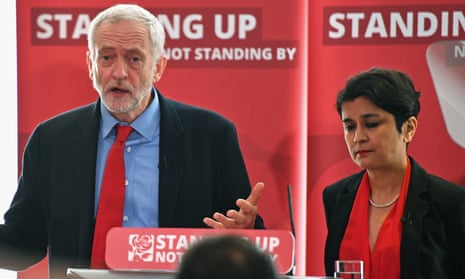To the question posed by the parliamentary committee last week, as to whether Shami Chakrabarti’s soft inquiry into antisemitism in the Labour party was a whitewash for which Corbyn brazenly rewarded her with a peerage, or evidence of a deep-seated reluctance to take the subject seriously, there is unlikely to be a satisfactory answer.
Where people are convinced of their own rectitude – and Corbyn and Chakrabarti belong to the more un-self-questioning wing of British politics – there is no separating what they know from what they don’t want to know.
The Chakrabarti inquiry didn’t fail, it was stillborn. Corbyn has always defended himself against the charge of antisemitism by protesting his freedom from all racisms – an insistence that feels like an evasion and blurs a crucial distinction – and the moment Chakrabarti widened the terms of her inquiry likewise, there was no hope for it.
To assert that antisemitism is unlike other racisms is not to claim a privilege for it. Hating a Jew is no worse than hating anyone else. But while many a prejudice is set off by particular circumstance – the rise in an immigrant population or a locally perceived threat – antisemitism is, as often as not, unprompted, exists outside time and place and doesn’t even require the presence of Jews to explain it. When Marlowe and Shakespeare responded to an appetite for anti-Jewish feeling in Elizabethan England, there had been no Jews in the country for 300 years. Jewishness, for its enemies, is as much an idea as it is anything else.
The part played by Jews in the evolution of Christianity has much to do with this. In the popular imagination, the Jew is the killer of Christ. To a philosopher like Nietzsche, the Jew is culpable not for rejecting Christianity but for inventing it. For cultures unable to make up their minds, whether they are heathen or Christian – remember those demonstrations of Teutonic paganism on the streets of Christian Germany 80 years ago – the Jew fits the bill of villain twice.
If the Jew transmogrified into the Devil for the medieval church, he retained his devilish characteristics as Christian sentiment found other places to express itself, early socialism being one of them. Weighted down with his Judas moneybags, rootless, usurous, conspiratorial and believing himself to be “chosen”, the Jew glided seamlessly into the demonology of the left. Not always, it should be said, without his own connivance. Many Jews have found one or other version of socialism compatible with their religious faith, while others have been quick to embrace a secular system in whose name they can jettison that faith altogether. The presence of a Jew in any movement no more guarantees it to be innocent of antisemitism than guilty. And that applies to anti-Zionism, too. Anti-Zionist Jews exist, but that tells one nothing about anti-Zionism.
It is here, in the matter of the existence of the state of Israel, that all the ancient superstitions about Jews find a point of confluence. We dance around this subject, afraid to confront it full on. But it has to be addressed: partly because all that has been thought about Jews in the past has a home in what we think about Israel now and partly because it is axiomatic to Labour that Zionism is a racist ideology – from which it follows that anti-Zionism cannot be called racist; we will not fix antisemitism, in the Labour party or anywhere else, until we fix Israel. I don’t mean fix its problems, I mean fix the way we talk about it.
The mantra bedevilling reasonable conversation about Israel is that the Jews have only one motive in labelling anti-Zionism antisemitic and that is to stifle legitimate criticism of Israel. This assertion defames Jews, the majority of whom, in my experience, take issue not with the idea of legitimate criticism, but with what in any given instance “legitimacy” amounts to. Criticism is not an inviolable concept. It can be moderate or extreme, truthful or mendacious, well-intentioned or malign. To complain when it is unjust is not to shut down debate. It cannot be exorbitant to argue that what will determine whether criticism of Israel is antisemitic is the nature of the criticism.
The effect of a libel is to exhaust trust. It should not be automatically assumed that, when it comes to Israel, Jews are incapable of arguing honestly, an assumption that itself edges dangerously close to the racism that is being denied. We need to separate this from that. No, “legitimate” (that is to say fair and honest) criticism of Israel as a nation among nations does not amount to antisemitism. Anti-Zionism, on the other hand – the repudiation of Israel’s right to exist – almost invariably does.
Zionism originated as a liberation movement. It grew out of an urgent concern, voiced by 19th-century Jews and gentiles alike, for the safety and wellbeing of Jews, and concluded that only if they had their own country would the deracinated Jews of Europe and elsewhere, including the Middle East, be free from discrimination and persecution. To deny its necessity, whatever its subsequent disappointments and betrayals, is to deny history. Zionism took many forms, but neither conquest nor colonial expansionism was one of them. If anything, Zionism was marked by a dreamy, not to say utopian idealism. Jews would return to the land and work hand in hand with their Arab brethren in an amity that would benefit them both.
Not all Jews believed it would work. The world didn’t need another nationalism, internationalists argued. True, Jews had suffered at the hands of everybody else’s and it was bad luck on them if lifeboats were to be declared illegitimate just as it was their turn to jump, but history can be cruel. It got a little crueller later and many a critic of Zionism was forced to eat his words when the death camps emptied.
Is that me playing the Holocaust card? Maybe Jeremy Corbyn and Baroness Chakrabarti would think so. Maybe their rooted suspicion of Jewish motives explains the paltriness of Chakrabarti’s report and the insolence of Corbyn’s refusal to take any criticism of it on board. But the more the Labour party puts its fingers in its ears, the greater the perception of its deafness will become. We need to talk about Zion.

